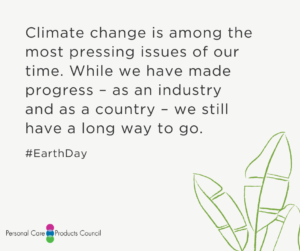Looking Towards a More Beautiful, Sustainable Future
By Lisa Powers
EVP, Public Affairs & Communications
Personal Care Products Council
Climate change is among the most pressing issues of our time. While we have made progress – as an industry and as a country – we still have a long way to go. The Biden administration recently put climate change back at the center of U.S. domestic and international policy by rejoining the Paris Agreement, which aims to combat climate change and to accelerate and intensify the actions and investments needed for a sustainable low-carbon future. This renewed focus on sustainability will impact our economy and the way we conduct business.
 The Paris Agreement works to strengthen the global response to the threat of climate change by reducing greenhouse gas (GHG) emissions and to assist developing countries in their efforts to combat climate change.[1] More than 70% of the global economy has set targets to reach net-zero emissions by 2050. “Net-zero” has become a global rallying cry and is a necessary step to beat back climate change and its devastation successfully.
The Paris Agreement works to strengthen the global response to the threat of climate change by reducing greenhouse gas (GHG) emissions and to assist developing countries in their efforts to combat climate change.[1] More than 70% of the global economy has set targets to reach net-zero emissions by 2050. “Net-zero” has become a global rallying cry and is a necessary step to beat back climate change and its devastation successfully.
The United Nations notes that a key element is powering economies with clean energy, replacing polluting coal, gas and oil-fired power stations with renewable energy sources, such as wind or solar farms. Climate action and investment in green industries create jobs and drive economic growth. Companies across all sectors are taking ambitious action to halt the devastating impacts of climate change.
The beauty industry has long been committed to ethical and transparent practices, as well as the responsible management of its environmental impacts and economic and social value. Many cosmetics and personal care products companies are taking action by committing to improving the efficiency of their energy use in transportation and operations, shifting toward renewable energy sources, and reducing carbon dioxide emissions.
More than two-thirds of PCPC members are actively managing energy use and carbon emissions in their operations. Companies have also set targets to reduce water consumption and improve water efficiency. Many have committed to zero waste to landfills for their manufacturing sites and have set ambitious goals to make all plastic packaging recyclable, reusable, compostable or refillable.
While we are proud of the efforts individual companies are making in the sustainable management of their businesses, we recognize companies large and small still have more to do. Our goal is to work in coalition, together with other like-minded organizations, to help create a more beautiful and sustainable world for us all.
As Earth Day approaches, we can all do our part in helping to address climate change. EARTHDAY.ORG offers these simple ideas:
- Get informed. Learn more about the science behind climate change, the responsibility that all sectors hold and their actions to address the crisis. Find out about emerging, evidence-based data that directly relates to changes in our climate.
- Hold yourself accountable. Take a personal inventory of your impact on the planet by calculating your carbon footprint. Consider offsetting carbon emissions by investing in clean and renewable energy projects worldwide that support local communities, drive sustainable development and protect our planet.
- Unplug. Unplug items when they are not in use, buy goods with high energy-efficient standards and consider switching to renewable energy.
- Travel smarter. Transportation is the largest source of carbon emissions in the United States. No matter where you live, travel by car or airplane contributes heavily to our shared carbon footprint. Take public transit, bike or walk when possible – it’s good for your health, your wallet and the planet.
- Consider your food. Your food’s carbon footprint is the GHG emissions produced by growing, harvesting, processing, transporting, cooking and disposing of the food we eat. Research revealed the tremendous impact that the mass production of meat, dairy and eggs has on our planet.
- Shop smarter. Support companies driven by sustainability and committed to transparency throughout the supply chain. Your power as a consumer can have an enormous impact. Shop smarter with thoughtful purchasing to minimize waste, and consider reused items to take part in the circular economy and keep goods out from filling our already overflowing landfills.
We can combat climate change, but it takes all of us — industry, consumers and the government. This Earth Day, what will you do to lead us to a more beautiful, sustainable future?
[1] https://unfccc.int/process-and-meetings/the-paris-agreement/the-paris-agreement/key-aspects-of-the-paris-agreement
